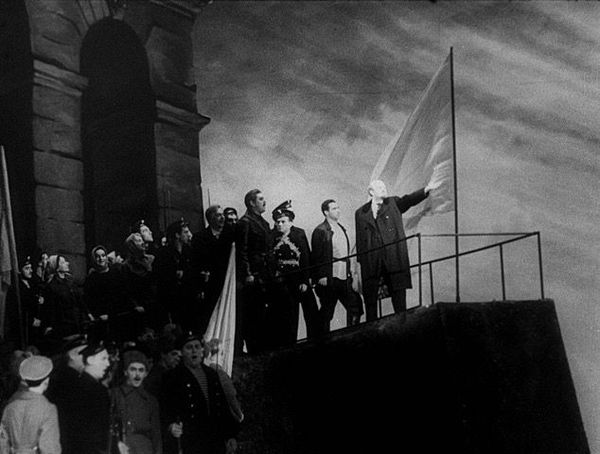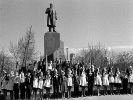Eye For Film >> Movies >> Revue (2008) Film Review
Revue
Reviewed by: Rebecca Naughten

Screening as part of the Sergei Loznitsa profile within AV Festival 2016's focus on radical Ukrainian documentary, Revue is assembled from the fruit of the director's assiduous search through Russian archives. Culled from the State-produced cine newsreel Our Land, Loznitsa's film deliberately avoids chronological markers (there are no onscreen titles nor a narrative voiceover) but utilises archival footage from 1957-1967, meaning that it predominantly depicts the propaganda of the Khrushchev era (1958-1964).
As the film unfolds it is possible to see changes not only in the type of event that was being recorded but also the way in which those events were presented. Initially the focus is on rural collectivism via a variety of farms - we are shown the group effort that went into planting and harvesting, fishing and threshing. The next stage moves on to the factories - a more industrialised form of labour - but still with an emphasis on individual effort for a collective cause, with workers pledging on camera to produce more than their assigned targets. The film continues to switch between the rural environment and urban factories but with increasing weight also being given to science as something that will enable the Communist State to achieve its goals.

Interspersed with this are examples of one aspect of the film's title - theatre productions, choir and orchestra performances, cultural rituals, traditional Cossack dancing, and a fantastic puppet show (supposedly showing the corrupt iniquities of Western rock 'n' roll but actually a brilliantly realised version of it). The latter is one of a series of overtly propagandistic films that gradually come to the fore as Revue progresses - in the absence of a narrative voiceover, these films inadvertently give an insight into the control exerted by the State in all areas of life, and through editing choices (i.e. what Loznitsa has chosen to juxtapose) provide a commentary on that control as well.
They are also reason why the film's title - Revue - can be taken to refer to two different levels of performance. On the one hand the cultural recitals and entertainment, and on the other the performance of the political - the obvious political symbolism on display (Lenin's image is everywhere) but also the way in which the State's influence can be seen in how people talk on camera, in the form of self-conscious political references and the generally stilted conversations that result. Apart from the theatrical productions, earlier segments in the film show people responding naturally on camera with relatively short sentences whereas as the film progresses those sentences become lengthy pre-prepared speeches. In one of the last sections, a 'Young Pioneer' (a child of no more than ten years of age) launches into a valedictory tribute to the Communist cause that is worthy of a politician (and in fact we have pointedly already seen Khrushchev in not dissimilar circumstances).
Were contemporaneous viewers conscious of the propagandistic nature of the newsreels? The early recordings of daily life in the provinces carry an implicit message about collectivism but the hand of the State weighs so heavily on the later chosen segments that it is almost comical and certainly blatant. What are we supposed to make of this sea change in the form and style of communication between the Party and the people? Loznitsa does not impose his opinions onto the material in an obvious fashion. As a result, Revue has the skittish and fragmented nature of a variety show and - although an interesting glimpse into another time and place - for this viewer it didn't quite add up to the sum of its parts.
Reviewed on: 19 Mar 2016














